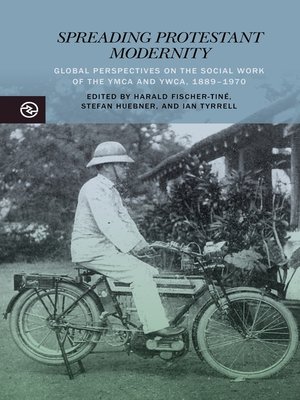Spreading Protestant Modernity
ebook ∣ Global Perspectives on the Social Work of the YMCA and YWCA, 1889–1970 · Perspectives on the Global Past
By Harald Fischer-Tiné

Sign up to save your library
With an OverDrive account, you can save your favorite libraries for at-a-glance information about availability. Find out more about OverDrive accounts.
Find this title in Libby, the library reading app by OverDrive.



Search for a digital library with this title
Title found at these libraries:
| Library Name | Distance |
|---|---|
| Loading... |
A half century after its founding in London in 1844, the Young Men's Christian Association (YMCA) became the first NGO to effectively push a modernization agenda around the globe. Soon followed by a sister organization, the Young Women's Christian Association (YWCA), founded in 1855, the Y movement defined its global mission in 1889. Although their agendas have been characterized as predominantly religious, both the YMCA and YWCA were also known for their new vision of a global civil society and became major agents in the worldwide dissemination of modern "Western" bodies of knowledge.
The YMCA's and YWCA's "secular" social work was partly rooted in the Anglo-American notions of the "social gospel" that became popular during the 1890s. The Christian lay organizations' vision of a "Protestant Modernity" increasingly globalized their "secular" social work that transformed notions of science, humanitarianism, sports, urban citizenship, agriculture, and gender relations. Spreading Protestant Modernity shows how the YMCA and YWCA became crucial in circulating various forms of knowledge and practices that were related to this vision, and how their work was co-opted by governments and rival NGOs eager to achieve similar ends.
The studies assembled in this collection explore the influence of the YMCA's and YWCA's work on highly diverse societies in South, Southeast, and East Asia; North America; Africa; and Eastern Europe. Focusing on two of the most prominent representative groups within the Protestant youth, social service, and missionary societies (the so-called "Protestant International"), the book provides new insights into the evolution of global civil society in the nineteenth and twentieth centuries, and its multifarious, seemingly secular, legacies for today's world.
Spreading Protestant Modernity offers a compelling read for those interested in global history, the history of colonialism and decolonization, the history of Protestant internationalism, and the trajectories of global civil society. While each study is based on rigorous scholarship, the discussion and analyses are in accessible language that allows everyone from undergraduate students to advanced academics to appreciate the Y movement's role in social transformations across the world.







